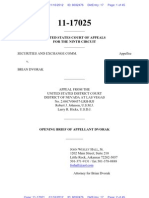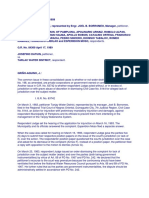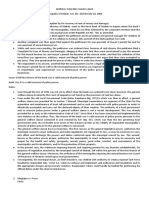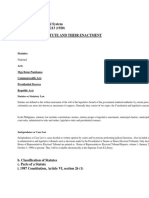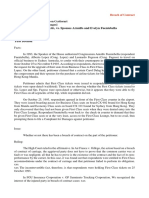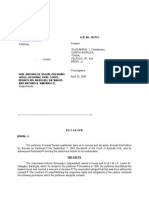Wqe65 To 75
Wqe65 To 75
Uploaded by
Ren Irene D MacatangayCopyright:
Available Formats
Wqe65 To 75
Wqe65 To 75
Uploaded by
Ren Irene D MacatangayOriginal Description:
Original Title
Copyright
Available Formats
Share this document
Did you find this document useful?
Is this content inappropriate?
Copyright:
Available Formats
Wqe65 To 75
Wqe65 To 75
Uploaded by
Ren Irene D MacatangayCopyright:
Available Formats
Sanciangco v. Rono Case No. 273 G. R. No. 68709 (July 19, 1985) Chapter 5, Page 203 , Footnote No.
106 FACTS: Petitioner was elected as Barangay Captain. Later, he was elected President of the Association of Barangay Councils (ABC) of Ozamiz City by the Board of Directors of the said Association. Petitioner then Petitioner then filed his Certificate of Candidacy for the May 14, 1984 elections for Misamis Occidental under the banner of the Mindanao alliance. He was not successful in the said elections. ISSUE: W/N an appointive member of the Sangguniang Panglungsod, who ran for the position of Mambabatas Pambansa in the elections of May 14, 1984, should be considered as resigned or on forced leave of absence upon filing of his certificate of candidacy. HELD: The legislative intent of Sec. 13(2) of BP 697 is clear that even appointive Barangay officials are deemed also covered by the said provision. Since he is unquestionably an appointive member, he is deemed to have ipso facto ceased to be such member when he filed his certificate of candidacy for the May 1984 Batasan elections. Laxamana v. Baltazar Case No. 144 G.R. No. L-5955 (September 19, 1952) Chapter III, Page 121, Footnote No.225 FACTS: The Mayor of Pampanga was suspended. By virtue of Sec. 2195 of the Revised Administrative Code, Respondent Vice Mayor assumed the office. However, the Provincial Governor, by virtue of Sec. 21 of the Revised Election Code, appointed herein Petitioner as the mayor. ISSUE: W/N Respondent is the right person to assume office. HELD: Yes, Respondent should assume the vacated position. Sec. 21 of the Revised Election Code, which was taken from Sec. 2180 of the Revised Admin Code, applies to municipal officers in general while Sec. 2195 of the Revised Administrative Code applies to the office of mayor in particular. A special provision overrides a general one. Also, the incorporation of Sec. 2180 in Sec. 21 does not enlarge its scope but merely supplements it. It has also been consistently held in case of suspension of the mayor, the vice-mayor shall assume office; the legislature is presumed to be acquainted with this contemporaneous interpretation. Hence, upon re-enacting Sec. 2180, the interpretation is deemed to have been adopted. Butuan Sawmill, Inc. v. City of Butuan Case No. 41 G.R. No. L-21516 (April 29, 1966) Chapter VI, Page 277, Footnote No. 119 FACTS: The Petitioner was granted a legislative franchise under RA 399 for an electric light, heat, and power system in Butuan and Cabadbaran, Agusan, together with the issuance of a certificate of public convenience and necessity by the Public Service Commission. However, the City of Butuan issued Ordinances numbered 11, 131 and 148 imposing a 2% tax on the gross sales or receipts of any business operated in the city. Butuan Sawmill, Inc. questioned the validity of the taxing ordinance which is deemed to have impaired the obligation of contract thereby depriving the Petitioner of property without due process of law. On the other hand, Respondent maintained
that it was vested with the power to provide for the levy and collection of taxes for general and special purposes as stipulated in its charter which was granted in 1950. ISSUE: W/N the inclusion of the franchise business of Petitioners falls within the coverage of the taxing ordinances pursuant to the citys power of taxation. HELD: No. the inclusion of the franchise business of the Butuan Sawmill, Inc. by the City of Butuan is beyond the broad power of taxation of the city under its charter. Neither could the latters power therein granted be taken as an authority delegated to the city to amend or alter the franchise, considering the absence of an express or specific grant of power to do so. Where there are two statutes, the earlier special and the latter general and the terms of the general are broad enough to include the matter provided for in the special the fact that one is special and the other is general creates a presumption that the special is to be considered as a remaining exception to the general as a general law of the land, while the other as the law of a particular case Manila Railroad Company v. Insular Collector of Customs Case No. 167 G.R. No. 30264 (March 12, 1929) Chapter VII, Page 301, Footnote No. 84 FACTS: Appellee Manila Railroad Company used dust shields made of wool on all of its railway wagons to cover the axle box which protects from dust the oil deposited therein which serves as lubricant of the bearings of the wheel. Under par. 141 of Sec. 8 of the Tariff Law of 1909, manufactures of wool, not otherwise provided for are subject to 40% ad valorem. On the other hand, under par. 197 of same law, vehicles for use on railways and tramways, and detached parts thereof are subject to 10% ad valorem. Appellant Insular Collector of Customs classified dust shields as manufactures of wool, not otherwise provided for. Upon appeal, however, the CFI overruled the decision and classified dust shields as detached parts of vehicles for use on railways. ISSUE: Whether dust shields should be classified as manufactures of wool or as detached parts of vehicles for use on railways. HELD: Dust shields are classified for the purposes of tariff as detached parts of vehicles under par. 197. It is a general rule in the interpretation of statutes levying taxes not to extend their provisions beyond the clear import of the language used. In case of doubt, they should be construed strictly against the government and in favor of the citizen. And when there is in the same statute a particular enactment and a general one which in its comprehensive sense would include what is embraced in the former, the particular enactment must be operative, and the general one must be taken to affect only such cases within its general language as are not within the provisions of the particular enactment.
Villegas vs. Subido Case No. 314 G.R. No. L-31711, (September 30, 1971) Chapter X, Page 411, Footnote No.96 FACTS: The Secretary of Finance authorized Jose R. Gloria of the Office of the City
Treasurer of Manila to assume the duties of Assistant City Treasurer. In an Administrative Order, series of 1968, Petitioner, Mayor of the City of Manila, directed Gloria to desist and refrain from exercising the duties and functions of the Assistant City Treasurer, saying that Romualdez is not empowered to make such designation. Petitioner, appointed Manuel D. Lapid as Assistant City Treasurer. Respondent, disapproved the appointment, basing his action, on an opinion of the Secretary of Justice, to the effect that the appointment of Assistant Provincial Treasurers is still governed by Sec. 2088a of the Revised Administrative Code, and not by Sec. 4 of the Decentralization Law, RA 5185. ISSUE: W/N the Decentralization Law should govern. HELD: No. It has been the constant holding of this court that repeals by implication are not favored and will not be so declared unless it be manifest that the legislature so intended. Such a doctrine goes as far back as United States v. Reyes, a 1908 decision. It is necessary then before such a repeal is deemed to exist that it be shown that the statutes or statutory provisions deal with the same subject matter and that the latter be inconsistent with the former. A subsequent statute, general in character as to its terms and application, is not to be construed as repealing a special or specific enactment, unless the legislative purpose to do so is manifest. Arayata v. Joya Case No. 9 G.R. No. L-28067 (March 10, 1928) FACTS: Cecilio Joya was leasing six friar lots, and he started paying the Government for such. Because the number of lands he can hold is limited, he conveyed some of the lots to respondent F. Joya as administrator. Cecilio died before fully paying the Government for the lands. His widow, herein petitioner, was ruled to own only one-half of the lot based on the Civil Code provision on conjugal property. The court then sought to deliver the property to Florentino for liquidation and distribution. Petitioner claimed that under Act 1120, Sec. 16, the widow receives all deeds of her deceased spouse upon compliance with requirements of the law. ISSUE: Whether the Civil Code provision on conjugal property prevails or Act 1120s full conveyance of the property to the widow. HELD: Act 1120 prevails. It lays down provisions regarding acquisition, disposition, and transmission of friar lands, which are contrary to the Civil Code. The Civil Code is a general law, while Act 1120 is a special law. The special law must prevail. Almeda v. Florentino Case No. 10G.R. No.L-23800 (December 21, 196 5 )Chapter VI, Page 26 5 , Footnote No. 67FACTS: RA183, the charter of Pasay City (enacted June 21, 1947), provides in its Sec. 14that Board shall have a secretary who shall be appointed by it to serve during theterm of office of the members On June 18, 1960, RA 2709 amended Sec. 12of RA 183. On the strength of Par. 2 of Sec. 12 of the Pasay City Charter, as amended,the Vice-Mayor of Pasay City appointed Petitioner Almeda as secretary of theMunicipal Board of said City. The very next day, the Board refused to recognizePetitioner as its secretary and, in turn, appointed Respondent Florentino to the position,purportedly under Sec. 14 of the City Charter. ISSUE: Which law applies on the matter of the appointment of the Secretary of theMunicipal Board of Pasay City? HELD:
The petition was dismissed. There is nothing in RA 2709 that indicates anyintention on the part of the Legislature to repeal, alter, or modify in any way theprovisions of Sec. 14 of R.A 183. Repeals by implication are not favored, unless it ismanifested that the legislature so intended. City of Manila vs. Teotico City of Manila vs. Genaro N. Teotico and CAG.R. No. L-230 5 2. 29 January 1968. A ppeal by certiorari from a decision of the C A Concepcion, J.:Facts: On January 27, 1958, Teotico was at the corner of the Old Luneta and P. Burgos Avenue, Manila,within a "loading and unloading" zone, waiting for a jeepney. As he stepped down from the curb toboard the jeepney he hailed, and took a few steps, he fell inside an uncovered and unlighted catch basinor manhole on P. Burgos Avenue. Due to the fall, Teotico suffered injuries. Teotico filed with the CFI Mlacomplaint against the City which dismissed the same. On appeal, CA sentenced the City of Manila to paydamages. Issue: WON the City of Manila have control or supervision over P. Burgos Ave making it responsible forthe damages suffered by Teotico. Ruling: Decision affirmed.In its answer to the complaint, the City, alleged that "the streets aforementioned were and have beenconstantly kept in good manholes thereof covered by the defendant City and the Thus, the City had, in effect, admitted that P. Burgos Avenue was and is under its controland supervision.Under Article 2189 CC, it is not necessary for the liability therein established to attach that the defectiveroads or streets belong to the province, city or municipality from which responsibility is exacted. Whatsaid article requires is that the province, city or municipality have either "control or supervision" oversaid street or road. Even if P. Burgos Avenue were, therefore, a national highway, this circumstancewould not necessarily detract from the City's "control or supervision David v. Commission on Elections Case No. 8 5 G.R. No. 127116 (April 8, 1997)Chapter X, Page 413, Footnote No. 10 5 FACTS: Barangay Chairman Alex David raised the question of when the barangayelections should be held and questions the schedule of holding suchelections on the 2nd Monday of May 1997. The basis is R.A. 7160 or theLocal Government Code which mandates barangay elections every 3 years.Petitioner David contends that an earlier law, R.A. 6679, should be the one followed.R.A. 6679 provides that barangay elections should be held every 5 years. He alsocontends that there is a violation of Art. 10, Sec. 8 of the Constitution. ISSUE: 1. What the term of office of barangay officials is.2. W/N there was a violation of Art. 10, Sec. 8 of the Constitution. HELD: 1. It is basic in cases of irreconcilable conflict between two laws that the laterlegislative enactment prevails. Furthermore, the Supreme Court in P aras v. COMELEC had the opportunity to mention when the next barangay election should be when itstated that next regular election involving the barangay office is barely 7months away, the same having been scheduled in May No. Art. 10, Sec. 8 of the Constitution provides that, term of office of elective local officials, except barangay officials, which shall be determined by law,shall be three It is not to be construed as prohibiting a 3-year term of officefor barangay officials.
TAC-AN vs COURT OF APPEALS G.R. No. L-38736 May 21, 1984 FELIPE G. TAC-AN, petitioner, vs. HONORABLE COURT OF APPEALS and ELEUTERIO ACOPIADO, MAXIMINO ACOPIADO, the SPOUSES JESUS PAGHASIAN and PILAR LIBETARIO,respondents. FACT: As payment foylegal services, Eleuterio Acopiado and Maximino Acopiado conveyed a parcel of land to Tac-An through a document entitled, Deed of Quitclaim. After the execution of the deed, the Acopiados told Tac-An that they were terminating his services. Moreover, Eleuterio sold his share of the land previously conveyed to Tac-An. On October 7, 1964, Tac-An filed a complaint praying that he will be declared owner of the land under consideration, that the sale of land belonging to Eluterio be nullified and that he be paid damages, attorneys fees, etc. But Court of Appeals voided the transfer of the land to Tac-An on the ground that the contract is not in accordance with the requirements of Administrative Code of Mindanao and Sulu for Contracts with Non-Christians. The Acopiados are Non-Christians, Section 145 of the Administrative Code of Mindanao and Sulu applies. The petitioner asserts that the revocation of the approval which had been given by the Provincial Governor has no legal effect and cannot affect his right to the land which had already vested. The petitioner also argues that the Administrative Code of Mindanao and Sulu was repealed on June 19, 1965 by Republic Act No, 4252, hence the approval of the Provincial Governor became unnecessary. Issue: Are the requirements of Administrative Code of Mindanao and Sulu still required? Held: When the Deed of Quitclaim was executed, Sections 145 and 146 of the Administrative Code of Mindanao and Sulu were in full force and effect and since they were substantive in nature the repealing statute cannot be given retroactive effect. Hence, the requirements of Administrative Code of Mindanao and Sulu stillrequired in contracts involving non-christians.
You might also like
- Certification Under Oath-Orion Energy IncDocument2 pagesCertification Under Oath-Orion Energy IncRen Irene D Macatangay75% (20)
- Directors Certificate TemplateDocument1 pageDirectors Certificate TemplateRen Irene D MacatangayNo ratings yet
- Atty Duka LaborDocument2 pagesAtty Duka LaborRen Irene D MacatangayNo ratings yet
- Heirs of Alberto Suguitan vs. City of MandaluyongDocument2 pagesHeirs of Alberto Suguitan vs. City of MandaluyongPatrick Cabañero100% (2)
- STATCON Case DigestsDocument236 pagesSTATCON Case Digestsrain060219920% (1)
- Certification Under Oath-TemplateDocument3 pagesCertification Under Oath-TemplateRen Irene D Macatangay75% (8)
- Case Digest CivilDocument2 pagesCase Digest CivilRen Irene D Macatangay100% (4)
- Jurisdiction-Bp 22 and EstafaDocument14 pagesJurisdiction-Bp 22 and EstafaRen Irene D MacatangayNo ratings yet
- Dvorak Opening BriefDocument45 pagesDvorak Opening Briefglimmertwins100% (2)
- Manila Railroad DigestsDocument12 pagesManila Railroad Digestsmelaniem_1100% (1)
- DigestDocument6 pagesDigestKristinaCuetoNo ratings yet
- Case DigestedDocument19 pagesCase DigestedJean Sibongga57% (7)
- UMALI vs. COMELECG.R. No. 203974Document8 pagesUMALI vs. COMELECG.R. No. 203974Lina DiazNo ratings yet
- City of Manila Vs SubidoDocument3 pagesCity of Manila Vs SubidoKcompacionNo ratings yet
- Tac-An Vs CADocument1 pageTac-An Vs CAKimberly Feldman100% (2)
- Homework Help Research Paper Help Online Tutoring Click Here For Freelancing Tutoring SitesDocument21 pagesHomework Help Research Paper Help Online Tutoring Click Here For Freelancing Tutoring SitesEvan TriolNo ratings yet
- 18 City of Baguio Vs de LeonDocument10 pages18 City of Baguio Vs de LeonYaz CarlomanNo ratings yet
- City of Baguio vs. de LeonDocument11 pagesCity of Baguio vs. de LeonMadelle PinedaNo ratings yet
- City of Baguio Vs de Leon GR No. L-24756Document6 pagesCity of Baguio Vs de Leon GR No. L-24756KidMonkey2299No ratings yet
- Loc-Gov - DigestsDocument6 pagesLoc-Gov - DigestsAdmin DivisionNo ratings yet
- Pub Corp 2Document20 pagesPub Corp 2MeAnn TumbagaNo ratings yet
- Consti 1: 2nd Exam CasesDocument97 pagesConsti 1: 2nd Exam CaseselizbalderasNo ratings yet
- Tanjay Water District V GabatonDocument5 pagesTanjay Water District V GabatonPaul Joshua SubaNo ratings yet
- Tanjay Water District V GabatonDocument5 pagesTanjay Water District V GabatonPaul Joshua Torda SubaNo ratings yet
- Public Corporations DigestDocument11 pagesPublic Corporations DigestJessie Albert CatapangNo ratings yet
- Public Corp DigestDocument7 pagesPublic Corp DigestJohn JurisNo ratings yet
- Statcon Case Digest (CH 1 - 5)Document40 pagesStatcon Case Digest (CH 1 - 5)Ven100% (3)
- Taxation Cases 2Document29 pagesTaxation Cases 2Claudine SumalinogNo ratings yet
- Sec. 10, Art. III ConstiDocument7 pagesSec. 10, Art. III ConstiSFar AbasNo ratings yet
- Case No. 92G.R. No. L-28997 (February 22, 1974) FactsDocument7 pagesCase No. 92G.R. No. L-28997 (February 22, 1974) FactsDennis SalemNo ratings yet
- 017 League of Cities of The Philippines (LCP) vs. COMELECDocument2 pages017 League of Cities of The Philippines (LCP) vs. COMELECthornapple25No ratings yet
- Bai Sandra Sema V. Comelec Didagen Dilangalen (GR No. 177597) Perfecto Marquez V. Comelec (GR No. 178628) FactsDocument4 pagesBai Sandra Sema V. Comelec Didagen Dilangalen (GR No. 177597) Perfecto Marquez V. Comelec (GR No. 178628) FactsPio MathayNo ratings yet
- Municipality of Candijay, Bohol v. CA and Municipality of Alicia, BoholDocument4 pagesMunicipality of Candijay, Bohol v. CA and Municipality of Alicia, BoholMDR Andrea Ivy DyNo ratings yet
- 01 Lopez Vs Villanueva FactsDocument12 pages01 Lopez Vs Villanueva FactsRio AborkaNo ratings yet
- Pub Corp DigestsDocument2 pagesPub Corp Digestsglan589No ratings yet
- UP V City Treasurer of Quezon CityDocument6 pagesUP V City Treasurer of Quezon CityTimothy JamesNo ratings yet
- Creation and Abolition of Municipal CorporationDocument10 pagesCreation and Abolition of Municipal CorporationLea Angelica RiofloridoNo ratings yet
- US vs. Gray (1 Phil 506)Document2 pagesUS vs. Gray (1 Phil 506)Camelle EscaroNo ratings yet
- City of Baguio vs. de Leon 25 SCRA 938Document6 pagesCity of Baguio vs. de Leon 25 SCRA 938Clarinda MerleNo ratings yet
- Mariano JR Vs Comelec 242 Scra 211Document2 pagesMariano JR Vs Comelec 242 Scra 211Myco MemoNo ratings yet
- Cordero v. Cabatuando - DigestDocument3 pagesCordero v. Cabatuando - DigestMaria LopezNo ratings yet
- Statutory Construction Case Digests 565b189496cdeDocument245 pagesStatutory Construction Case Digests 565b189496cdeMary Jean BartolomeNo ratings yet
- Case Digest - Villegas Vs SubidoDocument3 pagesCase Digest - Villegas Vs SubidoVic RabayaNo ratings yet
- Adarayan - LLG Assigned CasesDocument6 pagesAdarayan - LLG Assigned Casesjohndylao23No ratings yet
- Legal MethodsDocument468 pagesLegal MethodsEarlyBookwormHubNo ratings yet
- 32 Tanjay Water District Vs GabatonDocument4 pages32 Tanjay Water District Vs GabatonKingNo ratings yet
- Case Digest General WelfareDocument8 pagesCase Digest General Welfarecrystine jaye senadreNo ratings yet
- Docshare - Tips - Statutory Construction Case Digests PDFDocument267 pagesDocshare - Tips - Statutory Construction Case Digests PDFKaren Feyt Mallari100% (1)
- Statutorycon CasesDocument53 pagesStatutorycon Casesjoey celesparaNo ratings yet
- UST Cooperative Store Vs City of Manila (Digest)Document1 pageUST Cooperative Store Vs City of Manila (Digest)G SNo ratings yet
- Aboitiz Shipping Corporation VDocument5 pagesAboitiz Shipping Corporation VDarn Roque BustamanteNo ratings yet
- Tax 1 Case DigestsDocument5 pagesTax 1 Case DigestsMarinel RamosNo ratings yet
- Case Digests MidtermsDocument76 pagesCase Digests MidtermsCin100% (1)
- Tanjay V GabatonDocument5 pagesTanjay V Gabatonchavit321No ratings yet
- AmendmentsDocument4 pagesAmendmentsMer Manguera100% (1)
- Harden Vs BenguetDocument2 pagesHarden Vs BenguetTeacherEli100% (1)
- Batch 3 Case DigestDocument15 pagesBatch 3 Case DigestFeler Ed SisonNo ratings yet
- Hon Emiliano C Lopez V CSC and CLU V Exec Sec Case DigestDocument4 pagesHon Emiliano C Lopez V CSC and CLU V Exec Sec Case DigestBizmates Noemi A NoemiNo ratings yet
- PLDT Vs City of Davao 2001Document4 pagesPLDT Vs City of Davao 2001Benedick LedesmaNo ratings yet
- Stat Con Digests 3Document3 pagesStat Con Digests 3ClioNo ratings yet
- Oil Industry by Enacting R.A. 8180, Entitled The "Downstream Oil Industry Deregulation Act ofDocument3 pagesOil Industry by Enacting R.A. 8180, Entitled The "Downstream Oil Industry Deregulation Act ofClioNo ratings yet
- Petitioners vs. vs. Respondents Ernesto A Miguel Bonot, Cledera & AssociatesDocument8 pagesPetitioners vs. vs. Respondents Ernesto A Miguel Bonot, Cledera & AssociateselleNo ratings yet
- Laxamana Vs BaltazarDocument3 pagesLaxamana Vs BaltazarMarizPatanao100% (1)
- Cordero v. CabatuandoDocument2 pagesCordero v. CabatuandoAlexandrea CornejoNo ratings yet
- Hagonoy Water District VS - NLRC G.r.no. 81490 August 31 1988Document3 pagesHagonoy Water District VS - NLRC G.r.no. 81490 August 31 1988Joseph Tangga-an GiduquioNo ratings yet
- The Law of Allotments and Allotment Gardens (England and Wales)From EverandThe Law of Allotments and Allotment Gardens (England and Wales)No ratings yet
- Villanueva ReviewerDocument43 pagesVillanueva ReviewerRen Irene D MacatangayNo ratings yet
- Civil Digest2Document2 pagesCivil Digest2Ren Irene D MacatangayNo ratings yet
- Cathay Pacific Airways, LTD., vs. Spouses Arnulfo and Evelyn FuentebellaDocument2 pagesCathay Pacific Airways, LTD., vs. Spouses Arnulfo and Evelyn FuentebellaRen Irene D Macatangay100% (1)
- Civ 2 pp10Document1 pageCiv 2 pp10Ren Irene D MacatangayNo ratings yet
- Civ 2 pp8Document2 pagesCiv 2 pp8Ren Irene D MacatangayNo ratings yet
- Civ2 Case 1Document2 pagesCiv2 Case 1Ren Irene D MacatangayNo ratings yet
- ComplaintDocument2 pagesComplaintRen Irene D MacatangayNo ratings yet
- Civ2 Case 2Document2 pagesCiv2 Case 2Ren Irene D MacatangayNo ratings yet
- Amendment of AOIDocument3 pagesAmendment of AOIRen Irene D MacatangayNo ratings yet
- Business and Commercial Law and Corporate RehabilitationDocument4 pagesBusiness and Commercial Law and Corporate RehabilitationRen Irene D MacatangayNo ratings yet
- RA 9048 As AmendedDocument20 pagesRA 9048 As AmendedRen Irene D MacatangayNo ratings yet
- Be It Enacted by The Senate and House of Representatives of The Philippines in Congress AssembledDocument22 pagesBe It Enacted by The Senate and House of Representatives of The Philippines in Congress AssembledRen Irene D MacatangayNo ratings yet
- The Basics: Statement of Assets, Liabilities, and Net Worth: What Is A Saln?Document7 pagesThe Basics: Statement of Assets, Liabilities, and Net Worth: What Is A Saln?Ren Irene D MacatangayNo ratings yet
- Rent Control ActDocument3 pagesRent Control ActRen Irene D MacatangayNo ratings yet
- 173.016 - Uy and Roxas v. CA (1999) - DigestDocument4 pages173.016 - Uy and Roxas v. CA (1999) - DigestKarl SalvadorNo ratings yet
- Daniel Baker Order Probable CauseDocument22 pagesDaniel Baker Order Probable CauseWCTV Digital Team0% (1)
- Karin Wolf V New Jersey Department of Children and FamiliesDocument64 pagesKarin Wolf V New Jersey Department of Children and Familiesopracrusades100% (2)
- Vercide v. Hernandez DigestDocument3 pagesVercide v. Hernandez DigestAnit EmersonNo ratings yet
- Republic of The Philippines Manila Second DivisionDocument5 pagesRepublic of The Philippines Manila Second DivisionmehNo ratings yet
- 12th Quarterly Report For Oakland NSADocument85 pages12th Quarterly Report For Oakland NSAali_winstonNo ratings yet
- Fi2 Guerrero vs. RTC of IlocosDocument4 pagesFi2 Guerrero vs. RTC of IlocosGlady BolanteNo ratings yet
- Tomawis (VIRGILIO S. DAVID v. MISAMIS OCCIDENTAL II ELECTRIC COOPERATIVE, INC)Document2 pagesTomawis (VIRGILIO S. DAVID v. MISAMIS OCCIDENTAL II ELECTRIC COOPERATIVE, INC)Ahmad A. TomawisNo ratings yet
- Municipality of Cavite vs. RojasDocument2 pagesMunicipality of Cavite vs. RojasnerissatobillaNo ratings yet
- Case No. 11-2164: Bryan J. Brown Appellant v. Elizabeth Bowman, - AppelleesDocument35 pagesCase No. 11-2164: Bryan J. Brown Appellant v. Elizabeth Bowman, - AppelleesArchAngelInstituteNo ratings yet
- NBCP - Architectural Rules - For Local Building OfficialsDocument39 pagesNBCP - Architectural Rules - For Local Building OfficialsN.a. M. TandayagNo ratings yet
- Uniform Bonding Code (Part 2)Document18 pagesUniform Bonding Code (Part 2)Paschal James Bloise100% (1)
- Bernabe Vs BolinasDocument2 pagesBernabe Vs BolinasJuvy DimaanoNo ratings yet
- Lyceum Philippine University: College of LawDocument30 pagesLyceum Philippine University: College of LawSusannie AcainNo ratings yet
- SMC vs. NLRCDocument10 pagesSMC vs. NLRCHipolitoNo ratings yet
- Philippine National Bank vs. Aic Construction CorporationDocument2 pagesPhilippine National Bank vs. Aic Construction CorporationJay jogs100% (1)
- Herman Ssemuju Vs Attorney GeneralDocument7 pagesHerman Ssemuju Vs Attorney GeneralKellyNo ratings yet
- United Polyresins, Inc. v. PinuelaDocument4 pagesUnited Polyresins, Inc. v. PinuelaJolo RomanNo ratings yet
- Espiritu V LazaroDocument2 pagesEspiritu V Lazarosally deeNo ratings yet
- Dapper Labs' Motion To DismissDocument38 pagesDapper Labs' Motion To DismissDarius C. GambinoNo ratings yet
- Salvacion vs. Central Bank, GR No. 94723, Aug. 21, 1997Document11 pagesSalvacion vs. Central Bank, GR No. 94723, Aug. 21, 1997Inez Monika Carreon PadaoNo ratings yet
- Good Clean Love SuitDocument33 pagesGood Clean Love SuitElizabeth HayesNo ratings yet
- Philippine Amanah Bank (Now Al-Amanah Islamic Investment Bank of The Philippines, Also Known As Islamic Bank) vs. ContrerasDocument20 pagesPhilippine Amanah Bank (Now Al-Amanah Islamic Investment Bank of The Philippines, Also Known As Islamic Bank) vs. ContrerasElvin BauiNo ratings yet
- Herrera v. Leviste, 135 SCRA 129 (1985)Document11 pagesHerrera v. Leviste, 135 SCRA 129 (1985)Tris LeeNo ratings yet
- SCRA Annulment of Documents and Cancellation of TCTDocument10 pagesSCRA Annulment of Documents and Cancellation of TCTDarwin ViadumangNo ratings yet
- Terena Vs Hon de Sagun GR#152131 April 29, 2009Document9 pagesTerena Vs Hon de Sagun GR#152131 April 29, 2009Lernean HydraNo ratings yet
- 6 Official Opinions of The Compliance Board 9 (2008) : Thomas J. Mumford, III Linda KentDocument6 pages6 Official Opinions of The Compliance Board 9 (2008) : Thomas J. Mumford, III Linda KentCraig O'DonnellNo ratings yet
- Estate Agents Affairs Board Complaints FormDocument7 pagesEstate Agents Affairs Board Complaints FormpaulNo ratings yet
- ETHICS - Atty Maturan Vs Judge Gutierrez-Torres - Judge Must Exert Every Effort To Timely Rule Upon A CaseDocument10 pagesETHICS - Atty Maturan Vs Judge Gutierrez-Torres - Judge Must Exert Every Effort To Timely Rule Upon A CaseJerik SolasNo ratings yet








